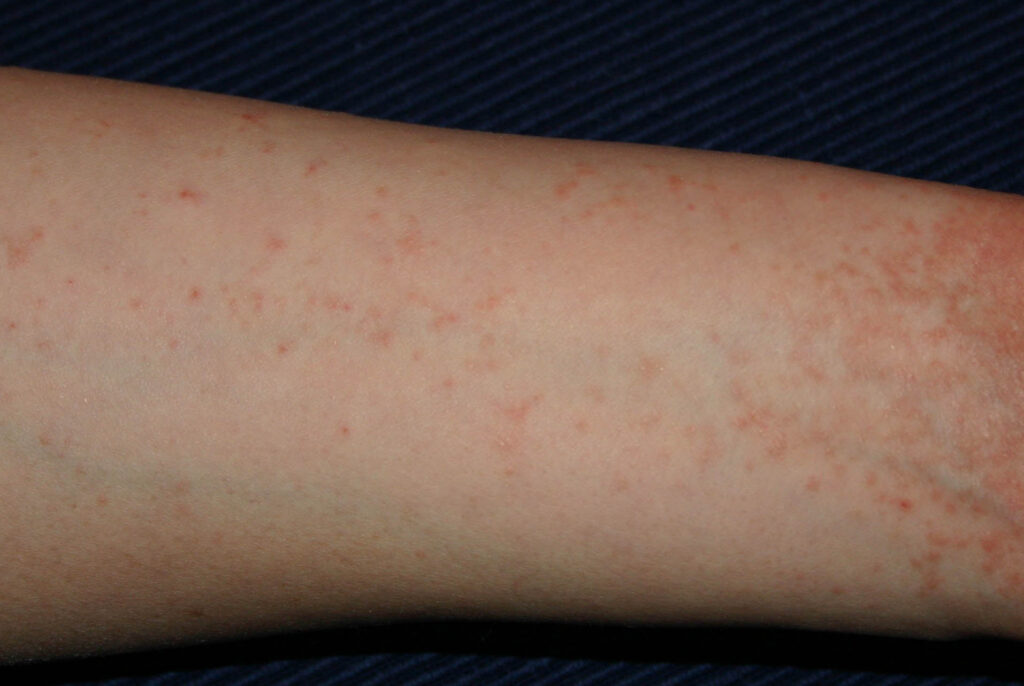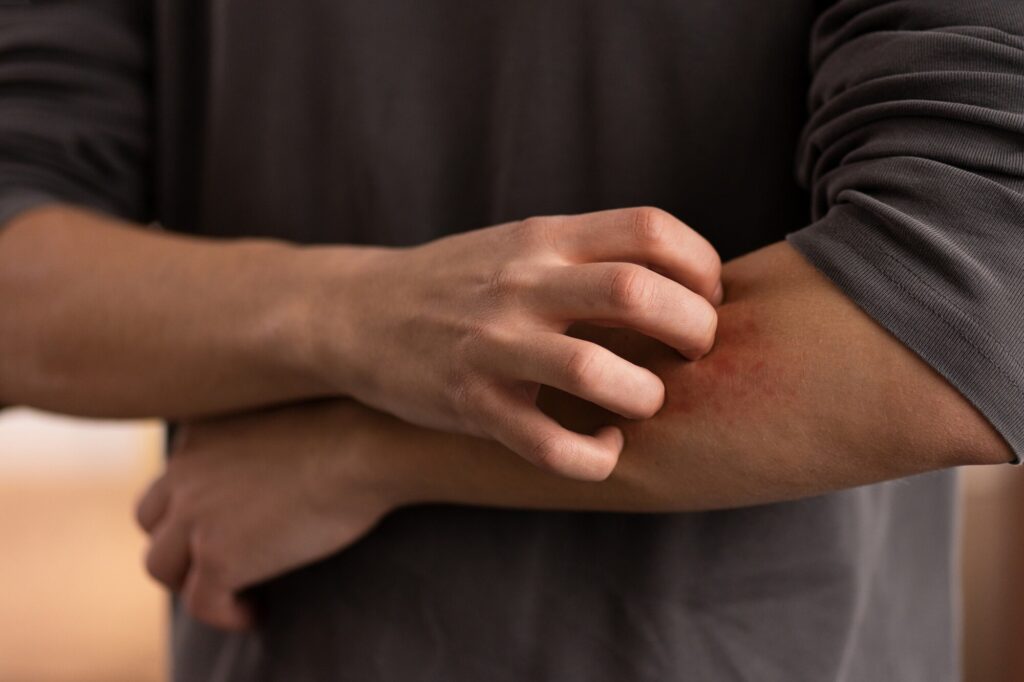Have you noticed tiny red dots appearing on your arms? It might be more than just a minor irritation. Doctors in the UK are urging people to pay attention to these small red marks, as they could be a sign of a contagious skin condition. If you’re experiencing this, it’s crucial to get medical advice promptly. Let’s dive into why these red dots could be a cause for concern and what you should do about them.
What Are These Tiny Red Dots? A Health Alert in the UK

Doctors are raising alarms about the sudden appearance of tiny red dots, especially on the hands and arms. These dots are often early signs of scabies—a contagious skin condition caused by mites burrowing into the skin. Scabies cases have surged recently, particularly in northern England, with reports indicating a 100% rise in cases. Medical experts are urging individuals with these symptoms to avoid close contact with others and seek treatment immediately.
What is Scabies and Why is it Spreading?
Scabies is a highly contagious skin condition caused by tiny mites that tunnel under the skin and lay eggs. While the condition itself is not considered life-threatening, it can lead to severe itching, rashes, and even secondary infections if left untreated. The mites spread easily through close physical contact, making it a significant concern in places like schools, dormitories, and shared living spaces.
- How Scabies Spreads Rapidly: Because scabies spreads through direct skin-to-skin contact, it’s common among young adults and children who engage in frequent social interactions. It can also be transmitted by sharing clothing, towels, or bedding with an infected person. Additionally, having multiple sexual partners increases the risk of contracting scabies.
- The Symptoms to Watch Out For: The most telling signs of scabies include severe itching, often worse at night, and a rash that can appear as small red bumps or dots. These red marks can develop into blisters and spread to other parts of the body. If you notice tiny red dots on your hands, wrists, or arms accompanied by intense itching, scabies could be the culprit.
Why You Shouldn’t Ignore the Early Signs of Scabies
While the red dots may seem harmless at first, ignoring them can lead to serious complications. If not treated, scabies can worsen, resulting in intense irritation and scratching, which can cause skin infections or exacerbate existing skin conditions.
- Complications of Untreated Scabies: According to Professor Kamila Hawthorne, Chairwoman of the Royal College of General Practitioners, untreated scabies can lead to secondary skin infections. In severe cases, scratching can break the skin, making it more vulnerable to bacteria, which can cause further health issues.
- Social Stigma and Delayed Treatment: Many people hesitate to seek treatment due to the stigma associated with scabies. However, delaying medical attention only increases the risk of spreading the infection to others and making the condition worse.
How to Treat and Prevent Scabies
If you suspect you have scabies, don’t panic—effective treatments are available. Here’s how you can manage the condition and prevent it from spreading:

- Use Prescription Medications: Scabies is typically treated with prescription creams and lotions that kill the mites and their eggs. Doctors often recommend permethrin cream or oral medication like ivermectin, depending on the severity of the case. It’s crucial to follow the treatment regimen precisely and to repeat it if necessary, as directed by your healthcare provider.
- Wash Clothing and Bedding Thoroughly: To prevent reinfection or spreading the mites to others, wash all clothing, bedding, and towels in hot water (at least 60°C). If washing at this temperature isn’t possible, seal items in a plastic bag for three days to ensure all mites are eliminated.
- Limit Close Contact: While you’re undergoing treatment, it’s essential to limit physical contact with others to avoid spreading the condition. This includes refraining from sharing personal items like clothes, towels, or bed linens.
- Stay Vigilant in Shared Spaces: Because scabies spreads easily in close quarters, it’s especially important for individuals in schools, dormitories, or group homes to stay aware of potential outbreaks. If one person in such a setting is diagnosed, others should be on alert and seek treatment at the first sign of symptoms.
Don’t Let Scabies Go Unnoticed: Seek Help Early
Despite the discomfort and social stigma associated with scabies, it’s important not to ignore the signs. If you suspect that you or someone close to you has scabies, seeking treatment promptly can prevent further spread and complications. Professor Hawthorne emphasizes that early medical intervention is key to managing the condition effectively and safely.

- Addressing the Social Stigma: Although there is a social stigma tied to scabies, it’s critical not to let embarrassment prevent you from getting the help you need. The sooner treatment begins, the faster you can recover and reduce the risk of passing the condition to others.
- What Doctors Want You to Know: The rise in scabies cases across the UK has prompted doctors to increase public awareness. They urge individuals to recognize the signs, take precautions, and seek professional help as needed. While the condition can be irritating, it’s treatable, and with the right steps, you can overcome it without complications.
Conclusion: Be Proactive About Tiny Red Dots
Spotting tiny red dots on your arms or hands? Don’t ignore them. These marks might be early signs of scabies, and prompt treatment can prevent complications and protect those around you. If you’re experiencing severe itching, rashes, or other symptoms associated with scabies, consult a healthcare professional right away. Remember, the sooner you act, the sooner you can resolve the issue and avoid spreading it to others. Stay informed, stay cautious, and take control of your health.


